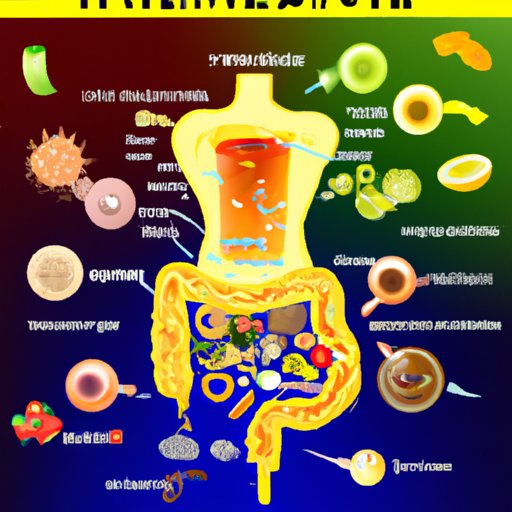Introduction
The digestive system is an amazing network of organs that work together to turn the food we eat into energy and nutrients that our bodies need. It begins in the mouth and ends in the small intestine, and it involves a complex process of breaking down food, absorbing nutrients, and eliminating waste. In this article, we will explore how the digestive system works and why it is so important for good health.
Explaining the Digestive Process Step-by-Step
The pathway that food takes through the body starts with the mouth, where chewing and saliva begin breaking down the food. The food then passes through the esophagus and into the stomach, where stomach acid helps break it down further. From there, it moves into the small intestine, where enzymes and hormones are released to help absorb nutrients from the food. The remaining waste then passes through the large intestine before being eliminated from the body.
Enzymes and hormones play a key role in the digestive process. Enzymes are proteins that help break down food into smaller molecules, while hormones are chemicals that signal the body to release enzymes and regulate other functions. Chewing, swallowing, and stomach acid also play an important role in breaking down food before it reaches the small intestine.
Overview of Major Organs Involved in Digestion
The digestive system includes several major organs that work together to break down food and absorb nutrients. These include the mouth, esophagus, stomach, small intestine, large intestine, pancreas, liver, and gallbladder.
The mouth is the first stage of digestion and is responsible for chewing and breaking down food. The esophagus is a muscular tube that carries food from the mouth to the stomach. The stomach produces stomach acid, which helps break down food. The small intestine is where most of the digestion and absorption of nutrients take place. The large intestine absorbs water and eliminates waste from the body. The pancreas produces enzymes and hormones that help digest food. The liver produces bile, which helps break down fats. The gallbladder stores and releases bile into the small intestine.
Describing the Role of Enzymes in the Digestive System
Enzymes are proteins that speed up chemical reactions in the body, including the breakdown of food. They are produced by the pancreas and other organs and travel to the small intestine, where they help break down carbohydrates, proteins, and fats into smaller molecules that can be absorbed by the body. There are several different types of enzymes, each with its own specific function. For example, amylase breaks down carbohydrates, protease breaks down proteins, and lipase breaks down fats.

Breaking Down the Different Types of Digestive Juices
In addition to enzymes, the digestive system relies on several different types of digestive juices to help break down food. Saliva is the first type of digestive juice and is produced by the salivary glands. It helps moisten and soften food, making it easier to swallow. Gastric juice is produced by the stomach and contains hydrochloric acid, which helps break down food. Bile is produced by the liver and stored in the gallbladder. It helps break down fats in the small intestine. Pancreatic juice is produced by the pancreas and contains enzymes that help break down carbohydrates, proteins, and fats.

Examining How Food is Broken Down and Absorbed
Once food has been broken down in the small intestine, it is ready to be absorbed. Nutrients are absorbed into the bloodstream and transported to cells throughout the body. Macronutrients such as carbohydrates, proteins, and fats are broken down into their individual components and absorbed. Micronutrients such as vitamins and minerals are also absorbed. Gut bacteria also play an important role in digestion. They help break down food and produce vitamins, among other things.
Once the nutrients have been absorbed, the remaining waste passes through the large intestine and is eliminated from the body. Water is also absorbed in the large intestine to help keep the body hydrated.

Discussing Disorders that Impact the Digestive System
There are several common digestive disorders that can affect the digestive system, including gastroesophageal reflux disease (GERD), irritable bowel syndrome (IBS), celiac disease, and Crohn’s disease. GERD is caused by the weakening of the lower esophageal sphincter, which allows stomach acid to flow back up into the esophagus. IBS is characterized by abdominal pain, cramping, and changes in bowel habits. Celiac disease is an autoimmune disorder that causes damage to the small intestine when gluten is consumed. Crohn’s disease is an inflammatory bowel disease that causes inflammation of the digestive tract.
Treatment for these disorders typically involves lifestyle changes and medications. Lifestyle changes may include avoiding certain foods, quitting smoking, and managing stress. Medications may include antacids, antibiotics, and anti-inflammatory drugs.
Exploring the Link between Diet and Digestive Health
The foods we eat can have a significant impact on our digestive health. Eating a balanced diet that includes plenty of fresh fruits and vegetables, whole grains, lean proteins, and healthy fats can help keep the digestive system running smoothly. Foods to avoid include processed foods, fried foods, and sugary drinks. Supplements and probiotics may also be beneficial for digestive health.
Conclusion
The digestive system is an intricate network of organs that work together to break down food and absorb nutrients. Enzymes, hormones, and digestive juices all play a role in this process. Common digestive disorders can cause unpleasant symptoms and should be treated by a healthcare professional. Eating a healthy diet and avoiding certain foods can help keep the digestive system running smoothly.
By understanding how the digestive system works and taking steps to keep it healthy, we can ensure that our bodies get the nourishment they need to stay strong and healthy.
(Note: Is this article not meeting your expectations? Do you have knowledge or insights to share? Unlock new opportunities and expand your reach by joining our authors team. Click Registration to join us and share your expertise with our readers.)
